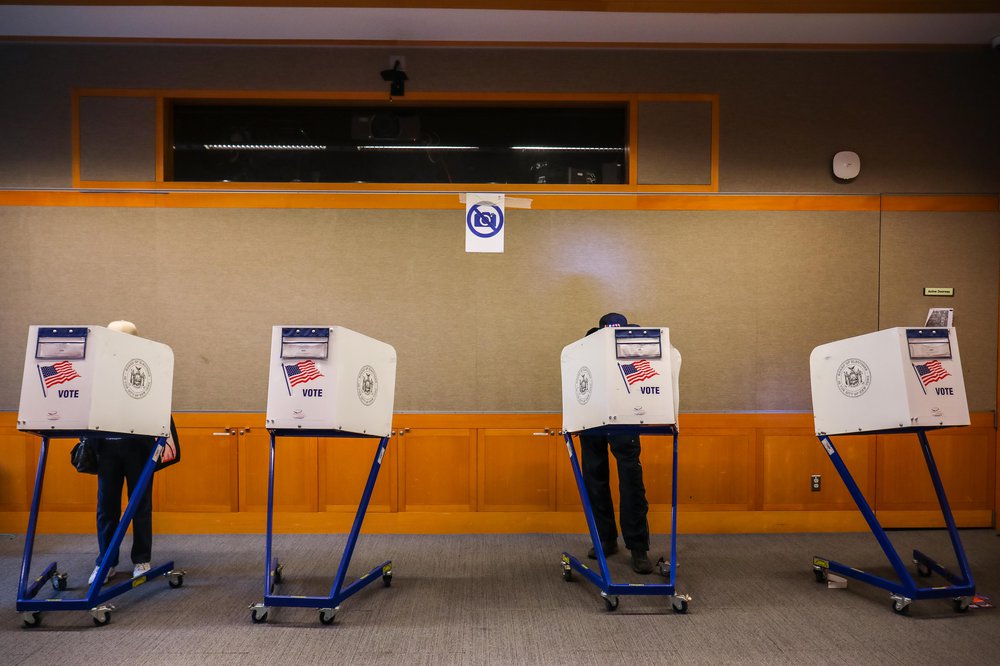NYC Enacts Law Allowing Noncitizens To Vote In Local Elections
Jan. 9, 2022, 8:43 a.m.
The law will enable anyone who has legally been in the city for 30-days to register and vote in local (but not state and federal) elections.

Early voting at The Met, October 2021.
New York City is on track to expand the right to vote in local elections to over 800,000 New York City residents who are living and working here legally, making the city the largest jurisdiction in the country to offer voting rights to noncitizens. The new law took effect at the stroke of midnight Sunday, 30-days after it was passed by the City Council. It will enable anyone who has legally been living in the city for 30-days to register and vote in local elections.
Mayor Eric Adams has spoken out in support of the legislation in the past, but his comments at the last mayoral debate in October and then again last month on the day the Council was voting on the bill signaled he had some reservations about the legality of the new law and specific concerns about the residency provision.
But late Saturday evening, Adams issued a short statement that said he will continue to support the legislation.
"While I initially had some concerns about one aspect of the bill, I had a productive dialogue with my colleagues in government that put those concerns at ease," said Adams. "I believe allowing the legislation to be enacted is by far the best choice, and look forward to bringing millions more into the democratic process."
During an appearance on CNN’s State of the Union on Sunday, Adams went further defending the legislation.
“I think it's imperative that people who are in a local municipality have the right to decide who's going to govern them, and I support the overall concept of that bill," he said.
Pressed by CNN’s Jake Tapper on whether the new law would “make a mockery" of United States’ citizenship and what he would say to people who were working to secure citizenship, Adams was unwavering.
"Don't let anything daunt you or take you away from that mission,” said Adams of people pursuing the lengthy citizenship process. “This legislation is not going to do that,” he added, “keep becoming a citizen of this country."
The law applies to legal permanent residents, people with working papers, and so-called "Dreamers." Advocates estimate that up to a million new people could register to vote in local elections starting in 2023 under the new law. The law does not permit these individuals to vote in state and federal elections.
Proponents of the legislation praised the mayor for standing up for the new law, pointing to his statement on Saturday and comments on national television on Sunday morning as a signal that he was ready to defend the law when and if potential court challenges arise.
"It sends both a message to immigrant communities who do a lot of work to keep New York City moving forward, that this is a mayor who supports them and champions them," said Nora Moran, director of policy and advocacy for United Neighborhood Houses, which has supported versions of this legislation for more than a decade. "His statement also signals to us a willingness to engage in dialogue around policy that just feels very refreshing," she added.
Other supporters offered cautious optimism about moving in the next phase of their campaign, from lobbying for the bill’s passage to encouraging its effective implementation.
"This is going to be a very long process of ensuring that this huge expansion of the franchise is done in the right way," said Murad Awawdeh, executive director of the New York Immigration Coalition.
He said advocates will be watching closely to ensure the New York City Board of Elections sets up the new voter registration process in a timely manner so that those eligible to participate can begin voting in elections starting next year. That will require the city BOE to set up a new protocol to register and identify these noncitizen voters in their registration files, which feed into the state’s voter registration database.
Within 60 days, a five-member advisory group is supposed to be set up to provide oversight and advice during the implementation process. It will be chaired by Public Advocate Jumaane Williams and made up of two mayoral appointees and two from the city council speaker.
But the new law is likely to hit speed bumps before it gets fully implemented in the form of lawsuits. Opponents like Staten Island Borough President Vito Fosella have already pledged to go to court to block the law.
Still, after years of advocacy, some of the law’s biggest boosters viewed the law taking effect Sunday as a giant leap forward. Former Council member Ydanis Rodriguez, who is now serving in the Adams administration as the Transportation Commissioner, called it one of his proudest moments working in government to see democracy expanded.
"I think New York City will now be a role model not only for the state of New York," said Rodriguez, "but for the whole nation."